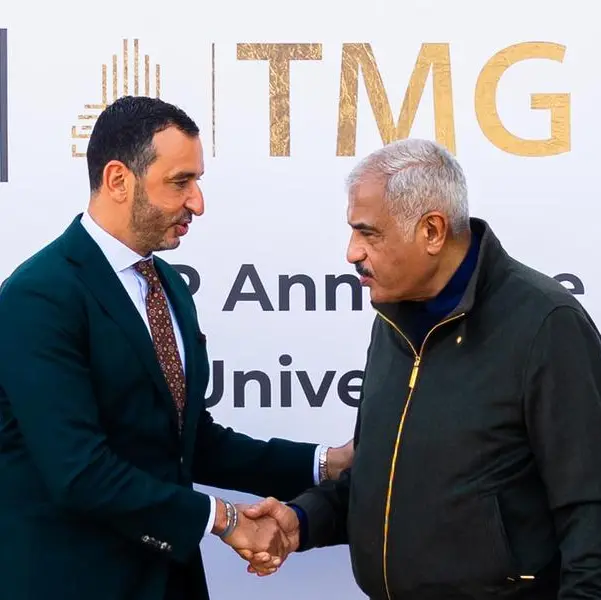As the 27th New Delhi World Book Fair (NDWBF 2019) focuses on increasing societal awareness about the special needs community being an integral part of community, the UAE Board on Books for Young People (UAEBBY) has hosted a panel discussion to attract the attention of publishers and cultural institutions on the need to strengthen efforts to produce more high-quality content for children with different disabilities.
The panel titled ‘It’s Not a Magical Book’ was held at the Sharjah Pavilion on Monday (January 7), as part of the emirate’s participation as the books fair’s guest of honour and brought together Rawan Barakat from Jordan, who is dedicated to encouraging reading and appreciation of books in children, especially those who are visually impaired, and runs the Raneen Foundation; Mohamed Al Nabulsi from Sharjah Humanitarian City; child psychologist, writer and critic of children's books, Dr. Ira Saxena; and Virbala Rastogi, a social worker who has dedicated herself to supporting differently abled children in India.
Talking about her experiences of working with children who are challenged by different disabilities, Rastogi observed: “Though there are several definitions of disability, I can just say that it’s a way of looking at people. I mainly work with children who have locomotive disability, or are impaired in their hearing, sight or speech. Just because most books are produced to serve mainstream readers, the needs of these children go unfulfilled. Not to say publishers, governments and NGOs worldwide haven’t come around to producing more accessible content in braille or other formats, but much is left to be desired by these children.”
“For instance, braille books are too heavy to be carried home, and most of them are too expensive for the average income-group parent in India to purchase. So, accessibility to good-quality reading materials remains a big problem for this segment of children even today,” she added.
Barakat went back to her life experiences, growing up as a visually impaired child in Jordan and the challenges she faced in accessing content she could read. “When I was a child, there was only one special primary school for visually challenged children that taught Braille. And audiobooks – they were unheard of. This was the main reason for me to start Raneen with my sister, because I wanted to bring stories alive for every child in the region who faced the same challenge as me.”
Rawan emphasised the need to integrate mainstream ideas and themes that are presented to regular children in books, into literature created for children with disabilities “We need to ask ourselves - when we love, we all love the same way; when we fight, everyone, disabled or otherwise, feels the same emotions. So, while we do need different formats of presenting content to these children in a way they can access and enjoy, my question is – do we need different content altogether? I certainly don’t think so.”
She also highlighted some of the biggest challenges that restrict the publication of content for children with special needs. These include, “high publication prices, lack of copyright security for such books, limited topics to talk about, and no special audiobooks applications for these children.”
All panellists agreed that more discussions need to be had between special needs experts, publishers and authors and illustrators, to find a solution to these and other challenges.
Al Nabulsi stressed on the need to use technology to benefit children with special needs. He said: “These children must be treated as equals, and one of the ways to do so is to introduce more technology-enabled and illustrations heavy books to schools libraries, so children with special needs can interact more with technology, while also benefit by its use and be on the same footing with their peers.”
Dr. Saxena highlighted the need to portray young characters in books who face certain disabilities. “Differences, natural or otherwise, have always been a source of conflict. As an author myself, I feel it is the duty of the entire writing community who write for special children to make them the protagonists of their stories. It is when these children see themselves as the heroes of a story that they will realise that they are no different from another child. By bringing them to the mainstream, we will also be doing the important work of making communities more aware that people with special needs are an integral part of their families and society at large.”
-Ends-
© Press Release 2019Disclaimer: The contents of this press release was provided from an external third party provider. This website is not responsible for, and does not control, such external content. This content is provided on an “as is” and “as available” basis and has not been edited in any way. Neither this website nor our affiliates guarantee the accuracy of or endorse the views or opinions expressed in this press release.
The press release is provided for informational purposes only. The content does not provide tax, legal or investment advice or opinion regarding the suitability, value or profitability of any particular security, portfolio or investment strategy. Neither this website nor our affiliates shall be liable for any errors or inaccuracies in the content, or for any actions taken by you in reliance thereon. You expressly agree that your use of the information within this article is at your sole risk.
To the fullest extent permitted by applicable law, this website, its parent company, its subsidiaries, its affiliates and the respective shareholders, directors, officers, employees, agents, advertisers, content providers and licensors will not be liable (jointly or severally) to you for any direct, indirect, consequential, special, incidental, punitive or exemplary damages, including without limitation, lost profits, lost savings and lost revenues, whether in negligence, tort, contract or any other theory of liability, even if the parties have been advised of the possibility or could have foreseen any such damages.



















